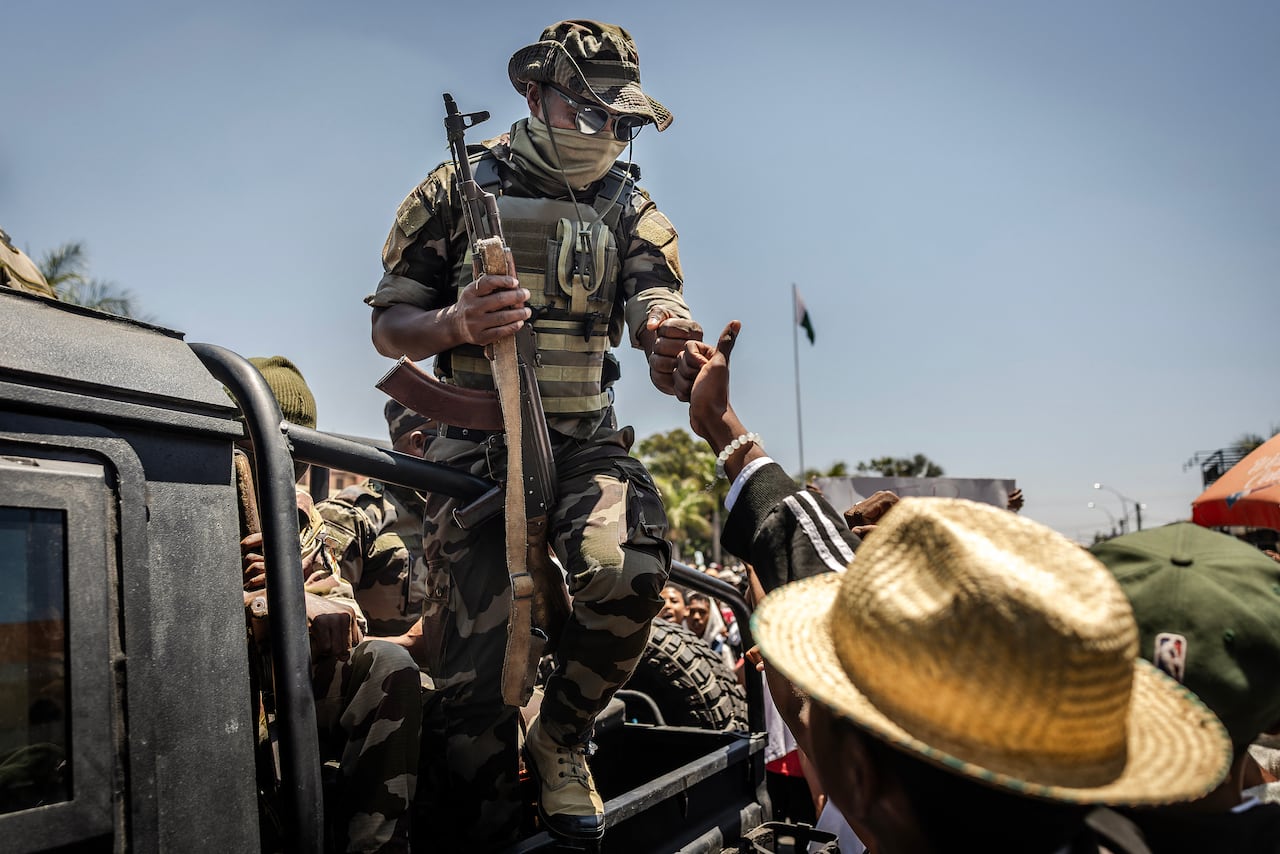Madagascar President Andry Rajoelina said he fled the country fearing for his life after a military mutiny, but did not announce his resignation in a speech broadcast on national television on Monday evening from an undisclosed location.
Rajoelina has faced weeks of anti-government protests led by Gen. Z, which reached a pivotal point on Saturday when an elite military unit joined the protests and called on the president and other government ministers to step down. This prompted Rajoelina to say that an illegal attempt to seize power was taking place on the island located in the Indian Ocean and to leave the country.
“I had to look for a safe place to protect my life,” Rajoelina said in his late-night speech, which was postponed for hours after soldiers tried to take control of the state broadcaster’s buildings.
These were Rajoelina’s first public comments since the CAPSAT military unit turned against his government in an apparent coup and joined thousands of demonstrators gathering in a main square in the capital, Antananarivo, over the weekend.
Rajoelina called for dialogue “to find a way out of this situation” and said that the constitution should be respected. He did not say how he left Madagascar or where he was, but a report claimed he was flown out of the country on a French military plane.

A spokesman for the French Ministry of Foreign Affairs declined to comment on this report.
Madagascar is a former French colony, and Rajoelina is said to have French citizenship, which has been a source of resentment for some Malagasy residents for years.
Anti-government protests began on September 25 over chronic water and electricity outages, but have evolved into broader discontent with Rajoelina and his government.
These are the most significant unrest in the island nation of 31 million people off the east coast of Africa since Rajoelina himself first took power as leader of a transitional government following a military-backed coup in 2009.
The same elite military unit CAPSAT that rebelled against Rajoelina was prominent in his first rise to power in 2009.
An elite unit claims control of the army
Rajoelina did not specify who was behind this coup attempt, but the CABSAT unit said that it now controls all of Madagascar’s armed forces and appointed a new officer in charge of the army, which the Defense Minister accepted in Rajoelina’s absence.
CAPSAT appears to be in a position of authority and also has the support of other military units, including the gendarmerie security forces.
CAPSAT commander Colonel Michael Randrianrena said the army had “responded to the people’s calls” but denied a coup had taken place. Speaking at the country’s military headquarters on Sunday, he told reporters that it was up to the people of Madagascar to decide what happens next, whether Rajoelina would leave power and new elections would be held.
Members of the Malagasy community in Montreal organized peaceful protests to denounce water and electricity shortages in Madagascar and call for freedom of expression.
Randrianirina said his soldiers decided to side with the demonstrators and exchanged gunfire with security forces trying to suppress the weekend protests, leading to the death of one of his soldiers. But there was no major street fighting and soldiers were riding in armored vehicles and waving Madagascan flags as people cheered in Antananarivo.
The US Embassy in Madagascar advised US citizens to stay put due to the “extremely volatile and unpredictable” situation. The African Union urged all parties, “both civilian and military, to exercise calm and restraint.”
Weeks of protests
Madagascar has been rocked by three weeks of deadly anti-government protests initially led by a group calling itself “Gen Z Madagascar.”
The United Nations says the demonstrations left at least 22 people dead and dozens injured, and has criticized Madagascar authorities for their “violent” response to protests that were largely peaceful in the movement’s early days. The government disputed the number of deaths.
Protesters raised a range of issues, including poverty, costs of living, access to higher education, and alleged corruption and misappropriation of public funds by government officials, as well as their families and associates.
Civic groups and trade unions also joined the protests, leading to the imposition of a nightly curfew in Antananarivo and other major cities. A curfew remains in effect in Antananarivo and the northern coastal city of Antsiranana.
The Gen Z protesters who started the uprising have rallied online and say they were inspired by the protests that toppled the governments of Nepal and Sri Lanka.
History of political crises
Madagascar witnessed the removal of many of its leaders in coups, and it has a history full of political crises since its independence from France in 1960.
Rajoelina, 51, first emerged as the leader of the transitional government following the 2009 coup that forced then-President Marc Ravalomanana to flee the country and lose power. Rajoelina was elected president in 2018 and re-elected in 2023 in a vote boycotted by opposition parties.
The Mauritius government said that Madagascar’s former prime minister under Rajoelina and one of the president’s closest advisers also fled the country and arrived on the nearby island of Mauritius in the early hours of Sunday. Mauritius said it was “not satisfied” with the private plane landing on its territory.
https://i.cbc.ca/ais/ae515a62-0554-4d9f-bd09-738705a06f5c,1760395406199/full/max/0/default.jpg?im=Crop%2Crect%3D%280%2C152%2C4000%2C2250%29%3BResize%3D620
Source link
